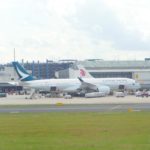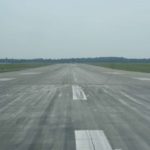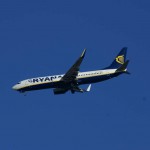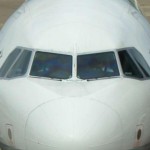Air navigation services handle flights safely, effectively and ecologically
With an increase of 5.4 per cent in the first quarter of 2007 compared to 2006, air traffic in Germany continues to grow. DFS Deutsche Flugsicherung GmbH controlled a total of 696,823 flights between January and March 2007. More than half of these flights took off or landed in Germany, while one third crossed Germany given its central location in the heart of Europe. The remainder (15.1 per cent) were domestic flights. Air traffic is therefore developing better than forecast by EUROCONTROL, the European Organisation for the Safety of Air Navigation. This organisation had forecast an average growth of 3.4 per cent between 2007 and 2013.
Frankfurt still tops the ranking of international airports with 116,589 take-offs and landings in the first quarter (+2.4 per cent over the same period in 2006). Munich Airport takes second place with 98,317 flights (+5.3 per cent), followed by the three Berlin airports with 54,292 flights (+2.7 per cent). Düsseldorf and Leipzig recorded particularly strong growth rates in the first quarter with +9.8 per cent and +31.4 per cent respectively.
Of the regional airports, Hahn led the field with 8,843 take-offs and landings in the first quarter (+17 per cent), followed by Dortmund with 5,809 flights (-12.9 per cent) and Paderborn with 4,456 flights (+0.5 per cent).
DFS controllers handle flights safely, effectively – and ecologically. Almost all flights are conducted as planned by the airlines. Only one per cent of flights in German airspace deviate from airways due to re-routing and holding procedures. Holding procedures and, therefore, higher CO2 emissions occur under poor meteorological conditions or when an airport is congested for another reason. For safety reasons, higher separation minima between aircraft are necessary in bad meteorological conditions. This may lead to holding patterns at airports that are already very busy.
By ensuring direct routings and an excellent punctuality record, DFS plays its part in ensuring ecologically sustainable air transport. In 2006, DFS Deutsche Flugsicherung GmbH was the most punctual air navigation service provider in Europe. Ninety-seven per cent of all flights in German airspace in the past year reached their destinations without any delays caused by air traffic control. These figures are taken from calculations by EUROCONTROL. Airlines themselves are mainly responsible for delays in German airspace (accounting for approximately 50 per cent of delays). Other reasons for delays are capacity shortfalls at airports (approximately 17 per cent of cases) and meteorological conditions (approximately 15 per cent). In Germany, each flight was delayed by an average of 0.63 minutes (37.8 seconds), of which DFS caused 0.07 minutes‘ delay (only 4.2 seconds).
This good performance record is thanks to effective management in operations. In fact, Germany was the first country in Europe to integrate civil and military air traffic control. Since the integration in 1994, military airspaces can be used by civil air traffic when they are not required for training purposes. Furthermore, DFS introduced area navigation in the year 2000. Now state-of-the-art navigation systems guide aircraft to virtual navigation points as well as ground-based navigation aids. This effectively disentangled the route network.
You will find more detailed information and graphs by visiting www.dfs.de. There you may also subscribe to the DFS Newsletter, which provides aviation-related information free of charge every second month.
DFS Deutsche Flugsicherung GmbH is a State-owned company under private law and has 5,200 employees. DFS ensures the safe and punctual handling of flights. Staff coordinate around 9,000 aircraft movements in German airspace every day, and almost 3 million movements every year.
Germany has the highest traffic volume in Europe. DFS operates control centres in Langen, Bremen, Karlsruhe and Munich. In addition, DFS is represented in the Eurocontrol Centre in Maastricht, the Netherlands, and in the control towers of the 17 international German airports. DFS has the following business units: Control Centre, Tower and Aeronautical Solutions.





